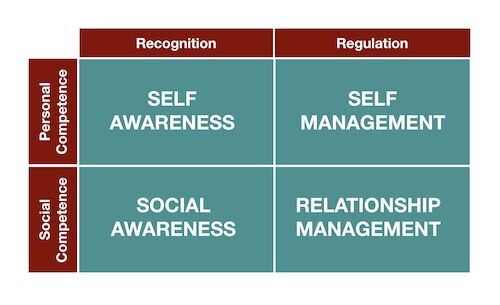2020 has been a real-time case study about the importance of emotional intelligence. It’s been a year of upheaval, chaos, and change. It’s been a year of stress, anxiety, and feeling overwhelmed. Through it all, we’ve had to find a way to stay connected to our colleagues and employees, map out and navigate new headings for our organizations, and get urgent work accomplished.
None of this is possible — with any degree of consistency or long-term success — without you, your colleagues, indeed all of your employees possessing higher levels of emotional intelligence.
Building Emotional Intelligence: A Brief Primer
Have you noticed impatience, seemingly low levels of empathy, or increasingly short tempers during video meetings? Has it been hard for some of your team members to build a sense of trust or to be accountable to each other for getting their work done? Are some employees having a difficult time handling disagreement or conflict in a remote work environment? Do you have colleagues or direct reports who seem to be unaware of how their behaviors are negatively affecting others? Perhaps you’ve noted some of this in your own behavior?
Higher levels of emotional intelligence help mitigate these unproductive and corrosive behaviors. Thankfully, people are not either “born with it, or without it.” Emotional intelligence can be developed and strengthened. There are proven strategies and techniques to help people build their capabilities.
Emotional intelligence is based on the work of Daniel Goleman and comprised of four core elements — visualized as a 2×2 matrix:

- Self-Awareness revolves around recognition and includes having an awareness of your own emotional state, understanding how your behavior impacts others — and appreciating how others impact you. For more about self-awareness, read Arden Coaching’s post, “Don’t Be Clueless — Emotional Intelligence and Self-Awareness.”
- Social Awareness is also concerned with recognition and includes empathy, discerning the mood and emotional state of others, and strong listening skills. For more about social awareness, read Arden Coaching’s post, “Strengthen Your Social Awareness Skills to Become a Great Leader.”
- Self-Management is your ability to regulate your personal behavior — also based on your awareness — and includes emotional self-control, adaptability, and maintaining a positive outlook. For more about self-management, read Arden Coaching’s post, “Leadership, Emotional Intelligence, and Self-Management.”
- Relationship Management is your ability to regulate your behavior with others — based on your awareness — and encompasses getting along well with others, influencing and inspiring others, teamwork, and handling conflict effectively. For more about relationship-management, read Arden Coaching’s post, “Managing Relationships: Peak Emotional Intelligence.”
Boosting Emotional Intelligence Increases Performance
Effectively building emotional intelligence is not a mysterious or abstract process. And while emotional intelligence is generally understood as an important characteristic for organizational leaders, as executive coaches, we recognize that emotional intelligence is crucial up and down the organizational ladder — from the CEO to front line employees. Its benefits are very real and it’s something everyone can relate to.
Where do you need to focus? Where are the “rough edges” of your emotional intelligence and the emotional intelligence of your organization’s employees? Some people are very self-aware but, nonetheless, struggle to manage their behaviors. Others are adept at managing one element, such as their adaptability or attitude, but have difficulty managing other elements, such as their relationships with others.
Moving forward, an increasingly important characteristic of successful, high-performing organizations will be their levels of emotional intelligence. Hone those skills now.
To learn more about emotional intelligence — from senior leaders to the front line — contact the executive coaches at Arden Coaching at info@ardencoaching.com or 646.684.3777.

